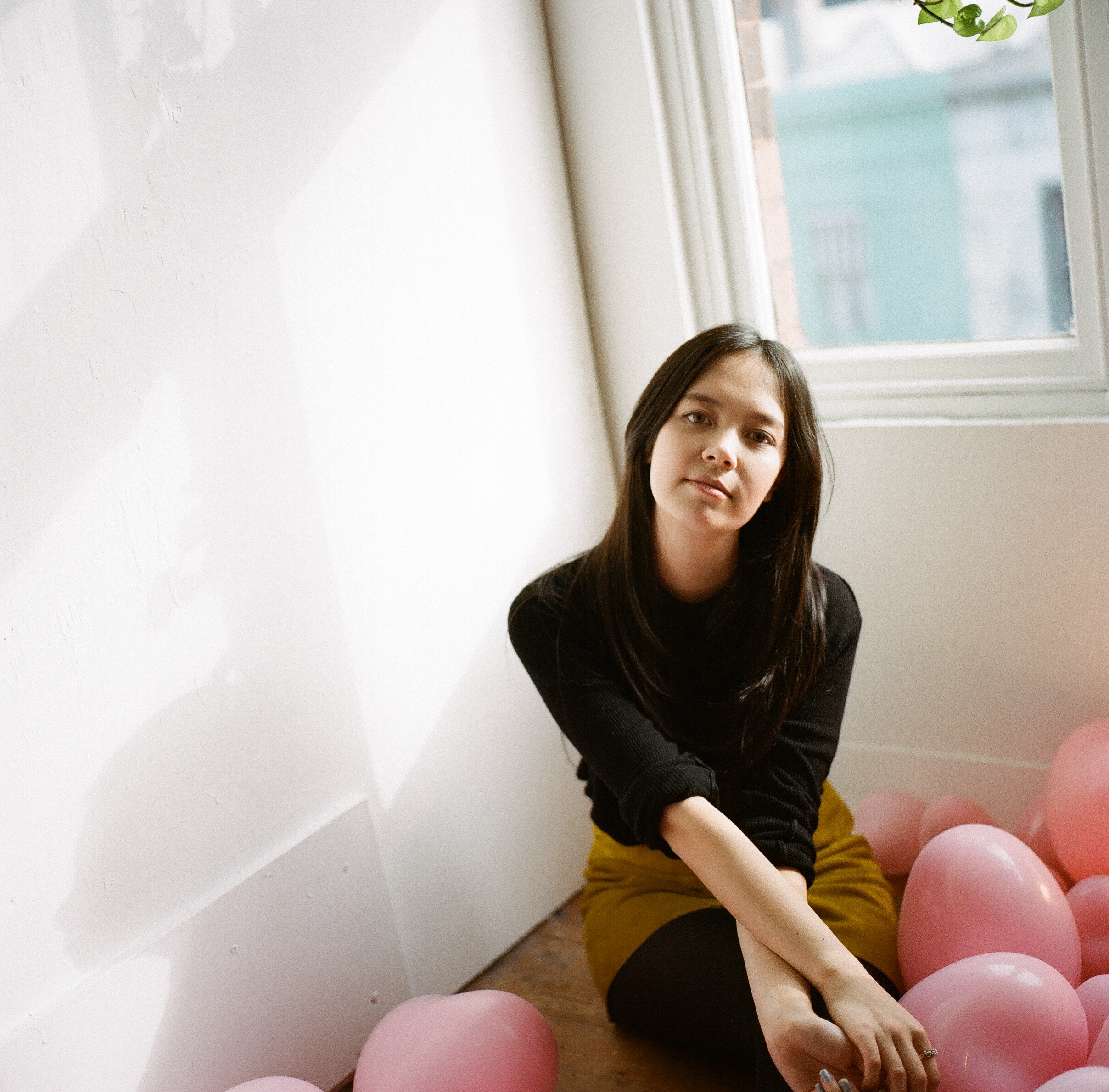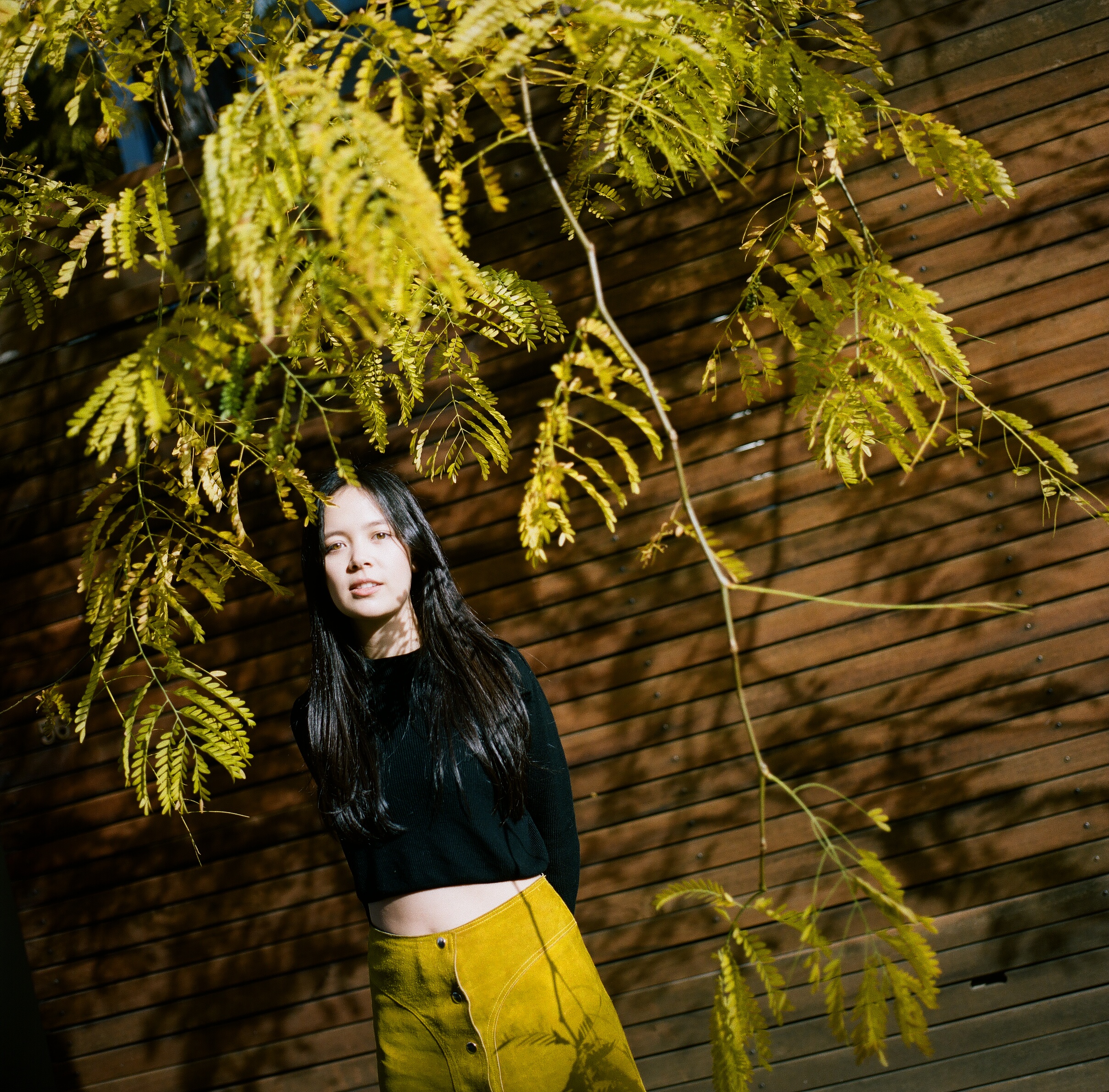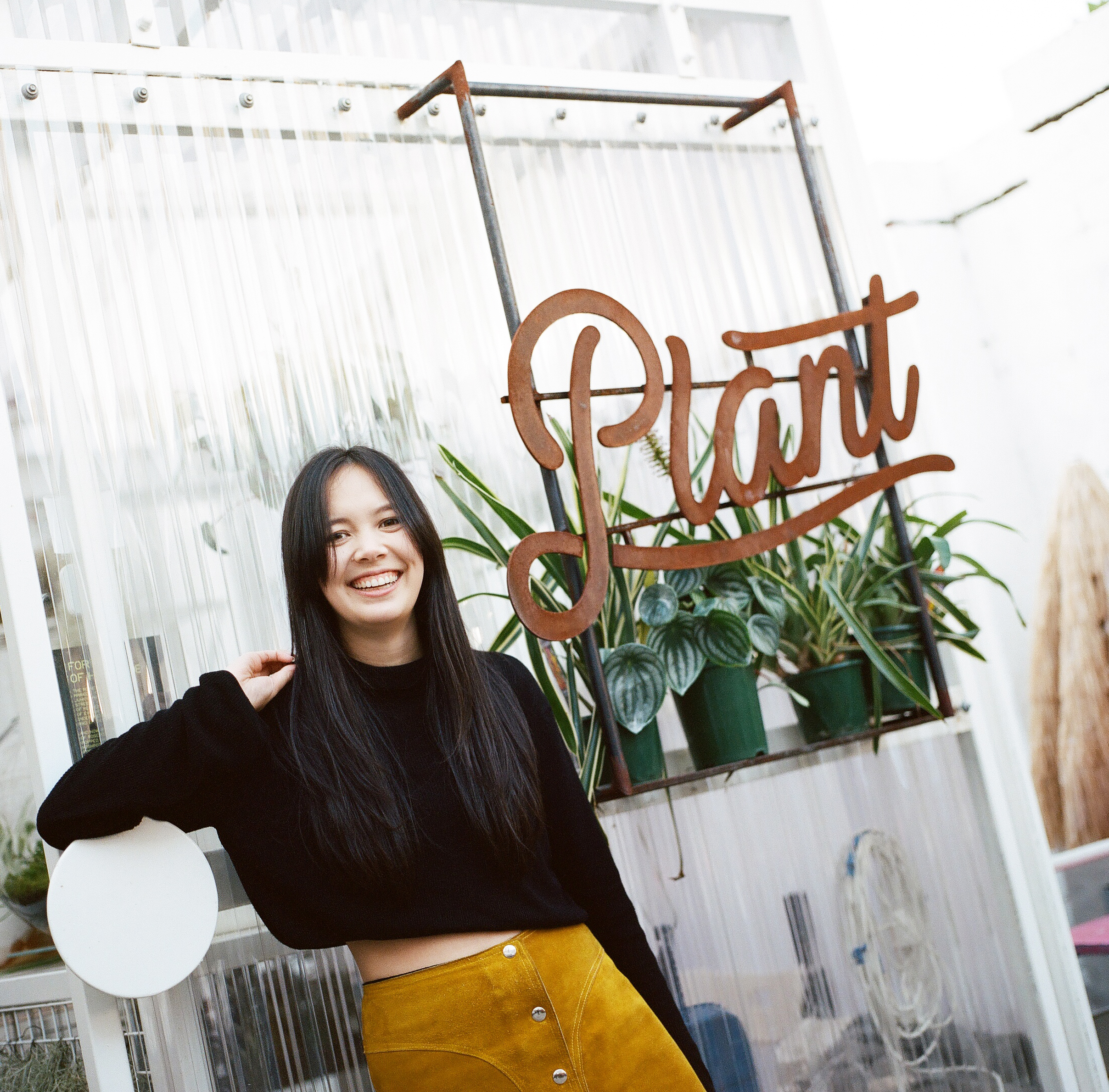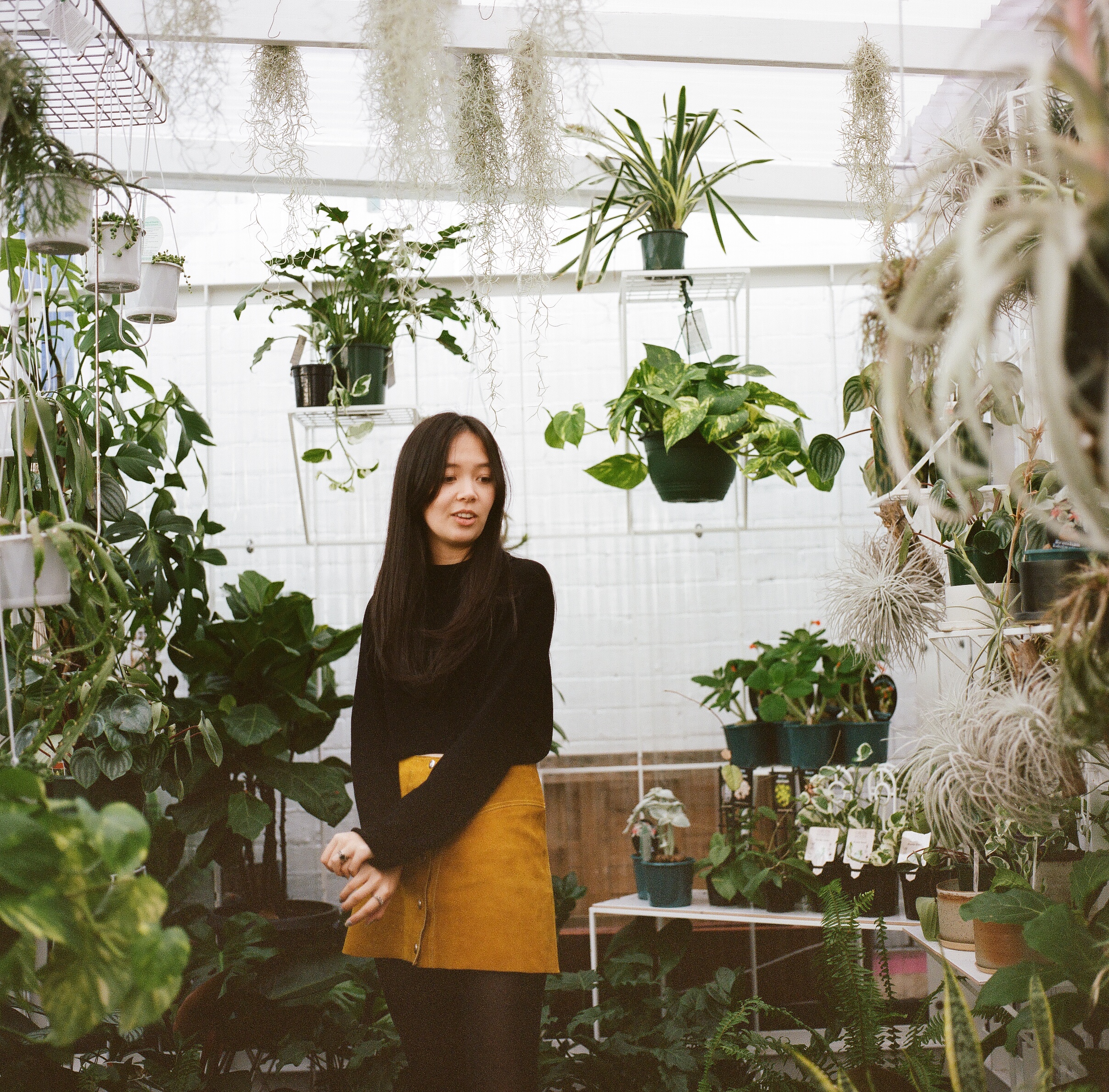Interview #31 — Charlotte Nicdao
Charlotte Nicdao is a Filipina-Australian actor and musician. She has worked on critically-acclaimed series Please Like Me, SyFy’s adaptation of Arthur C Clark’s Childhood’s End, and NBC’s Camp. Charlotte is an advocate for more diverse stories and faces on Australian screens.
Charlotte speaks to Leah Jing McIntosh about whitewashing in the film industry, her work on Please Like Me, and keeping plants alive.
You started your acting career with A Gurl’s World, and have since worked on The Slap, Time of Our Lives, Camp, and Please Like Me—when and how did you first decide to be an actor?
I sort of fell into acting. My father, Alfred Nicdao, was always doing a bit of acting here and there; he was actually one of the first Asian actors to be on Australian TV! When I was younger, every now and then his agent would send me in for auditions.
Growing up, I was certain I wanted to be a musician. I was offered the role in A Gurl’s Wurld when I was seventeen, and at the time I just thought it would be a good adventure. After A Gurl’s Wurld finished I went back to doing music and started a degree at VCA. Strangely, what made me realise that I wanted to pursue acting was missing out on a role that I had thought I was born to play. I was devastated for weeks after being rejected. It finally dawned on me that I’d never felt that kind of disappointment in my life, so doing this must be something I really wanted.
An Asian-Australian acting legacy! Do the two of you talk about acting?
The great thing about growing up with a parent who was in the industry was that I always had very realistic expectations of what being an actor would be like. He still talks a lot about the ups and downs of the job, he’s such a strong support for me and probably understands more than most when I need to vent about the frustrations of whitewashing. Recently we’ve been having a lot of conversations about acting and storytelling. This year we were talking about how hard it can be to keep pushing through setbacks as an artist, I was feeling a lot of uncertainty at the time.
Dad was adopted by my wonderful Lola and Lolo, and he said to me, for all we know, we come from a long line of storytellers, its in our blood, and when something is so inherent it’s important to pursue it as hard as you can. That conversation resonated with me so much. I don’t think anyone inspires me as much as my Dad.
I'm definitely fangirling about your work on Please Like Me.
Oh, I fangirled hard working on that show. My first day on set was a scene where Tom (Thomas Ward) and I are in bed together, in our underwear. It’s a testament to everyone involved that I felt so comfortable rocking up mostly naked on my first day at work.
I will say, nothing beats having a serious discussion about how to make pad wings look as striking as possible through fishnet stockings. We ended up sticking the wings on top of the stockings and then drawing the fishnet pattern onto them in fine-liner. I got way too comfortable hitching my skirts up (in front of 200 extras) so that the wonderful—and very professional—wardrobe assistants could fiddle with my crotch. It was an incredibly fun set to be on because everybody was so invested, and truly believed we were making something special.
Your character, Jenny, seems a world apart—how did you prepare for the role?
It’s funny, because I remember reading the script before auditioning and cringing at all the ways Jenny reminded me of my teenage self. I think I was probably a bit better at hiding the over-eagerness, the desire to be accepted by others, but I definitely spent a good part of my high-school years trying very, very hard to be seen as one of the cool, hipster kids. As with any role, I really tried to focus on believing wholeheartedly in Jenny, without judgment, and how high the stakes were for her. That’s where the comedy comes from, for me; in a character just desperately trying not to be laughed at.
What is your experience of the industry, as an actor of colour? I know you've written on the struggle of recognition for non-white actors.
Some days I feel that we’re progressing, and other times I feel utterly defeated. I work in an industry that repeatedly affirms that they don’t see people of colour as important or interesting. However, I am excited that we’re seeing more complex, diverse characters and more colour-blind casting.
Screen Australia released a document last year called ‘Seeing Ourselves: Reflections on Diversity in Australian Drama’. The research findings showed that 'while there are strong examples across all Australian broadcasters of programs that draw on, reflect and ‘normalise’ many of our marginalised communities, they are still the exception rather than the rule.' What’s your take on the difference between Australia’s national screen industry to that of Hollywood?
Part of the reason that I’ve been traveling to LA so much over the last couple of years is that, in the US, I feel like I can play anything—I’m less restricted by my ethnicity, though obviously it’s not a perfect artistic landscape. I would love to be living and working in Australia for the rest of my life, and in many ways I’ve been extremely fortunate with the projects I’ve been a part of here, and the extremely talented people I’ve had the opportunity to work with. However, there’s a lot of ways that our industry disappoints me.
Recently I auditioned for a small role, and it seemed my character’s primary function was to have racism spewed at them to demonstrate that a (white) lead character was racist. The sad thing is, when I received this brief it seemed so natural to me; it took a moment before I was like, wait a minute—I am more than this, and I should be allowed to expect more than this.
White-washing and yellow-face is most blatantly apparent within the film industry, as it’s so much harder to disguise—it's 2017, and we still have actors like Scarlett Johansson, Emma Stone, Tilda Swinton and Matt Damon taking up space. Is there anything we, as an audience, can do to change this, or is this something that has to happen from the top down?
If we refuse to accept whitewashing and put our money where our mouth is, we’re forcing producers, and networks to listen. More than that, I think it’s really important not just to boycott the films that are doing it wrong, but also to support the films that are doing it right. Making a lot of noise as an audience is definitely having an effect on the people at the top.
Part of the reason Moonlight won the Oscar was because it was catapulted into to the Academy’s consciousness by cinema-goers who booked out the theatres on opening weekend. It’s easy to be angry about Ghost in the Shell on the internet, but, for the cinematic landscape to change, we need to demand more content about, and for, people of colour.
As a biracial Filipina-Australian, you straddle two cultures—do you think this duality of experience adds to your ability as an actor?
I think anyone who has grown up as something of an outsider develops unique ways of viewing the world, other people. In many ways, I think the opposite is also true – my experiences as an actor have helped me gain a better understanding of my identity as a woman of colour. Acting is one of the only professions where you can, without pretence, be granted or miss out on job opportunities based on your ethnicity or gender. My social identity plays a big part on which characters available to me. You can’t help but start examining the way your community views you, and how Western culture places you in the world, but it also gives you the opportunity to embrace the uniqueness of your experience.
It’s through stepping outside and looking back at myself as an actor that I’m able to see—and then break—the limitations that I, my industry, and my society place on myself as a woman of colour, as a Filipina-Australian.
What would you like to see changed in the industry?
I would like everybody to put more effort into making things new. I want people to be more open to the idea that they might have a limited perspective, and those outside of their immediate frame of experience might have things to say that the world could fall in love with.
You’ve describe yourself as a ‘passive-aggressive sunshine pop fairy’. You’ve trained in classical and jazz music, yet moved into the pop world to form Charlotte Nicdao and the Sloth Orchestra. What was the impetus for this transition?
After I left VCA, I experienced this total freedom; it wasn’t just from the creative constraints of educational institutions, but also from the pressure I’d placed on myself to be a certain kind of musician, based on the community I was a part of and the musicians I admired.
There was a time where if I hadn’t done at least three hours of practice a day, I would feel stressed and panicky. My approach was very structured, and it was really influenced by the way my peers talked about their approach. A lot of my close friends are still musicians, and, while I have so much admiration for the way professionals approach their craft. For me, that approach was really stifling. The structure really killed my ability to decide what I wanted to create, and the fear of messing up made me so nervous that I often lost the ability to do technical things that I was totally capable of.
A lot of what I do musically now is based around trying to figure out what I actually like. What I want to be creating without trying to be impressive, or accessible, or 'just like' some other artist I admire. It’s a really difficult thing to do, but also exciting. Suddenly, after many years, I was able to just do whatever I wanted—and what I wanted was to dress up and get drunk on stage and perform train-of thought-songs that weren’t trying to impress anyone. There was a year or so there where I was fairly prolific; writing these silly, tongue-in-cheek songs, playing gigs where we made the audiences dress up, and making youtube videos where I just yelled at the camera. I was really lucky to have so many talented musicians around me who were open to playing this stuff that was just totally different to what we had been studying. I had great friends who really supported me in building that whole thing.
As a woman of colour, how have you found the Australian music scene?
When I was studying, I found that, as a woman, people would immediately assume you’re no good, and then it’s your responsibility to prove them wrong—it’s always she’s just a singer, does she write her own stuff? or who’s the guy that’s telling her what to do? It constantly disappoints me that these are often the responses from white men, who are succeeding within a framework that disproportionately benefits them.
Men are supported by other men without question. Discussions around privilege of any kind in the music scene seem to exacerbate all the natural insecurities that these men have about their abilities, so that they refuse to even engage with the problem—they just get angry and start chanting reverse racism, reverse sexism, no preferential treatment for anyone (but us).
What does success look like to you?
Everyone always says that being extremely wealthy apparently isn’t all it’s cracked up to be – I’m skeptical but I guess I’ll have to take their word for it. I guess success is a complete acceptance of self. We’re all imperfect, growing, changing creatures, we can’t change that, but success looks like being okay with that mess, loving yourself anyway, and getting on with the picture of your life that excites you most.
You also run a business, the incredible Plant By Packwood with your partner, Bayden Hine.
Bayden has always been such a green thumb and I’m unfortunately a plant killer, so for Valentines Day a few years ago he made me a terrarium as a here’s a plant you can’t kill gift. I loved it, and as with any beautiful, handmade gift, I immediately thought, we could sell these! We’ve really just grown from there—starting as a little slap-dash market stall, to our current form of a custom-built nursery and terrarium-ery in Fitzroy.
Bayden collects rare plants, and especially loves lush tropical plants which are so beautiful and very hard to keep alive in Melbourne. The warmest room in our house is the 'Plant Room,' because it’s more important that that the plants don’t get cold than us staying warm! My favourite plant is this beautiful dark, velvety leafed plant called Philodendrum Gloriosum.
How do you navigate being in a cross-cultural relationship?
Growing up with the kind of privilege that white men do, there have definitely been ways in which Bayden’s tripped up, or misunderstood, or not immediately been able to empathise.
Having said that, every time I speak about my experiences he truly, truly listens; he never tries to speak over me or disagree, and he takes full responsibility for trying to make things better. Not to give him a cookie just for being a decent person (and he’d never ask for one, either), but navigating a cross-cultural relationship can be pretty rocky for both parties. There are so many things out of our control. There will always be a part of me—and I think most POC in relationships with white people experience this—that feels like he’ll never truly understand. So given all that, I’m very grateful that the parts which are in our control—the eagerness to learn, to be better, to stand together, support, lift up—feel so strong.
Lately, I’ve really been trying to break down the subtle, under-the-surface ways I view our relationship from the outside. I’m only just becoming aware of how pervasive those stereotypes around white guys with Asian women are. It’s to the point that sometimes I catch myself feeling self-conscious when I mention to people we’re married – there’s still a small part of me that worries people will think Bayden is 'settling' for an Asian woman, or, worse, that I’m some sort of mail-order (ugh, I hate that term) bride. It’s certainly not constant, and is obviously much easier for me as an English speaking, mixed-race Asian/White woman than it would be for many other Asian women in cross-cultural relationships. But it hurts me to know that along with all the things I’ve learnt about my own identity and worth as a WOC, along with all the things I’m proud of, I’ve still been conditioned deeply enough that I occasionally feel the need to prove to strangers that I’m just as valuable to my partner as a white woman would be.
Do you have any advice for emerging actors or musicians?
Do it because you love it, and don’t take yourself too seriously.
What are you inspired by?
Unexpected art, and art in unexpected places. And little girls on TV being bad-ass.
What are you currently listening to?
Podcasts. I love Codeswitch for non-preachy, always enlightening discussions about race, and Hidden Brain for 'wow, cool' social science, and the so-uncharismatic-he’s-charismatic host Shankar Vedantam. I’m also getting really into pop music at the moment.
What are you currently reading?
Woolf’s Mrs Dalloway. I just finished A Room of One’s Own and after closing the book walked around my empty house just out-loud repeating the word 'YES.' I’m also reading Love in The Time Of Cholera and, oh gosh, it is so rich and magical and hilarious and visceral—I’m absolutely in love.
How do you practice self-care?
Cooking, tea in bed, and when things are really dire—packet Mi Goreng and Buffy. I’ve also really been trying to persuade myself lately that it’s okay not to be perfect, and it’s okay for people to be disappointed in me sometimes.
What does being Asian-Australian mean to you?
More and more, it means everything to me.
find out more
Photographs & Interview by Leah Jing McIntosh
Shot at Hello Heartbreak and Plant By Packwood








